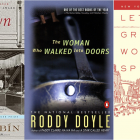Exit Strategy

In six weeks, I’ll be done with my MFA. No more workshops, no more craft classes, no more hanging out in the creative writers’ house, no more external structure or deadlines. It’ll be back to the years B.P.S. (Before Poetry School): making my own schedule for writing, revising, and submitting work, and not being accountable to anyone other than myself.
I’m excited, a little nervous, and a little sad.
For the past two years—and for the first time, really—I’ve had the benefit of a community of working writers, a physical hub for my writing life where I can go to work on and revise my writing, and the opportunity to take classes with some of the most talented poets and writers in the country. While I’ll be glad to downgrade to a less hectic existence come May, I’m going to miss having all this input and reinforcement. Writing poetry is generally a solitary exercise, and earning my MFA introduced me to the social and collaborative aspects of the craft for the first time.
This isn’t to say that I expect my newfound poetry bros (broets?) to vanish immediately upon graduation; I know I’ll keep in touch with many of them, and we’ll continue to exchange work on a regular basis. But without the structure of the semester and the weekly deadlines and gatherings that workshop entails, it’s easy to slip into a maybe-later, if-the-muse-moves-me kind of methodology for writing and sending out work. I was pretty disciplined before the MFA, but now I worry I may have come to rely too heavily on my cohort and professors for cues as to when to write, how to revise, and when work is ready to send out.
So, I’ve started planning what I’ve come to call my exit strategy: a plan to re-acclimate to my pre-MFA existence while simultaneously kicking old, bad habits and preserving the new good ones I’ve picked up during my two years at NYU. As with all exit strategies (in my imagination, at least), it comes in the form of a bulleted list:
• Come out swinging. I feel like the first six months out of the program are going to be critical, and may well determine how long I keep writing afterward. I’ve heard horror stories of people who were so utterly wrung out by their programs that they didn’t write for months or even years after they finished; some actually never wrote again. I want to avoid that (and also get a head start on returning to a self-imposed schedule, mentioned below) by hitting the ground running: writing, revising, submitting, resubmitting. Lather, rinse, repeat.
• Stay connected. One of my bad habits before I started my MFA program was to eschew any and all forms of writerly society, be it casual bro-downs (these can be throwdowns, hoedowns, or showdowns) or networking (going to conferences, attending panels/readings/talks, &c). Going forward, I want to maintain my connections to the larger writing community both for the benefit of my poetry and my so-called career (insofar as “poet” is a career). This can’t be limited to reading literary magazines and new books of poetry; it’s got to involve meeting living, breathing poets and talking to them about that poetry, even (especially) if that only amounts to getting a drink with an old classmate or professor.
• Set up a realistic schedule and stick to it. This is a good habit I had before starting my MFA and one I feel like I’ve got to preserve. I’ve started transitioning back to my pre-graduate school system of writing daily, regardless of whether a deadline imposed by a workshop or instructor is looming. I write almost every day now, but I think it’s got to be every day once I’m out of the program or it’s not going to stick.
I’ve also started recording self-imposed deadlines on my calendars and to-do lists. I really dig the satisfaction of completing a task and crossing it off a list, and having physical (or digital) lists on which I can do that helps keep me motivated and allows me to track progress.
• Revise with a mind to the audience. As I’ve said before, the MFA not only introduces you to the idea of audience in a very immediate way, but provides you with a kind of schizophrenic Greek chorus of mental editors on whom you can call while writing forever afterward. (In keeping with maintaining my writerly connections, I now also have the benefit of writing them an e-mail and asking their opinion!) This means that all my future poems—not just the ones I brought to workshop—will benefit from the ideas, influences, questions, and opinions of my classmates and professors at NYU, and from every writer with whom I have the good fortune to work in the years to come.



